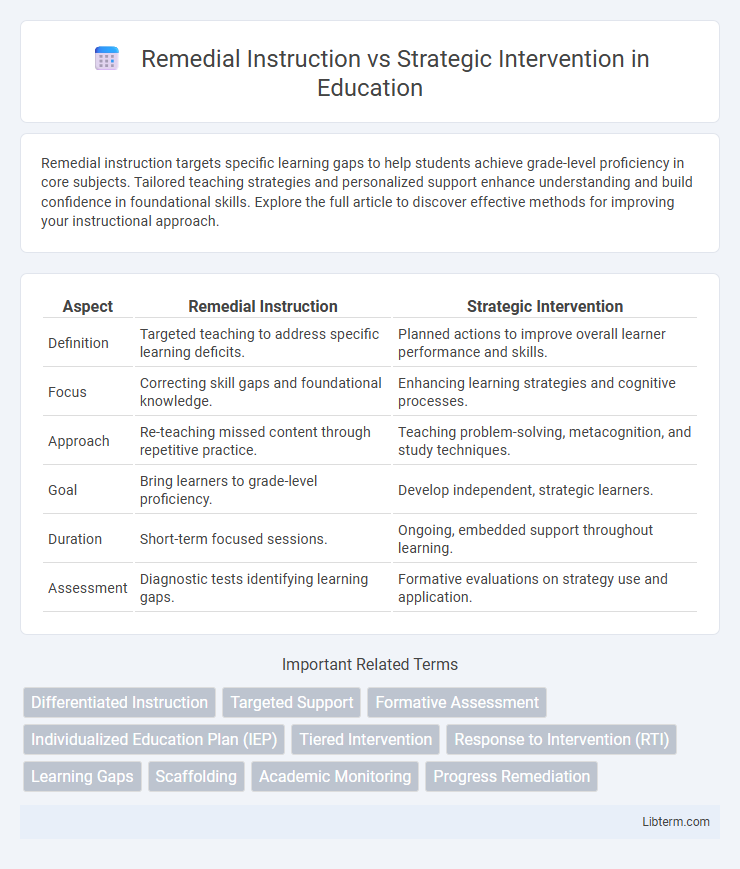Remedial instruction targets specific learning gaps to help students achieve grade-level proficiency in core subjects. Tailored teaching strategies and personalized support enhance understanding and build confidence in foundational skills. Explore the full article to discover effective methods for improving your instructional approach.
Table of Comparison
| Aspect | Remedial Instruction | Strategic Intervention |
|---|---|---|
| Definition | Targeted teaching to address specific learning deficits. | Planned actions to improve overall learner performance and skills. |
| Focus | Correcting skill gaps and foundational knowledge. | Enhancing learning strategies and cognitive processes. |
| Approach | Re-teaching missed content through repetitive practice. | Teaching problem-solving, metacognition, and study techniques. |
| Goal | Bring learners to grade-level proficiency. | Develop independent, strategic learners. |
| Duration | Short-term focused sessions. | Ongoing, embedded support throughout learning. |
| Assessment | Diagnostic tests identifying learning gaps. | Formative evaluations on strategy use and application. |
Introduction to Remedial Instruction and Strategic Intervention
Remedial Instruction targets students who have fallen behind in fundamental skills, offering tailored support to bridge learning gaps and enhance academic proficiency. Strategic Intervention encompasses a broader approach, combining targeted teaching methods and continuous assessment to proactively improve students' learning strategies and outcomes. Both methodologies aim to improve educational performance but differ in scope and application intensity.
Defining Remedial Instruction
Remedial instruction targets students experiencing specific learning deficiencies by providing tailored lessons to strengthen foundational skills in core subjects like reading, math, and writing. This approach often involves smaller group sessions or one-on-one tutoring to address identified gaps and ensure mastery of essential concepts. By focusing on individualized support, remedial instruction enhances academic performance and builds confidence in struggling learners.
Understanding Strategic Intervention
Strategic intervention is a targeted educational approach designed to address specific learning gaps by employing data-driven methods and personalized techniques. This approach emphasizes continuous assessment and adaptive teaching strategies to improve student outcomes efficiently. Unlike general remedial instruction, strategic intervention focuses on pinpointing underlying issues and implementing precise solutions to foster long-term academic growth.
Key Differences Between Remedial Instruction and Strategic Intervention
Remedial instruction targets specific skill deficits by providing repetitive practice and foundational content review, aimed at bringing students up to grade-level standards. Strategic intervention emphasizes teaching cognitive and metacognitive strategies to enhance overall learning processes and problem-solving abilities. While remedial instruction focuses on closing knowledge gaps, strategic intervention develops independent learning skills to prevent future academic struggles.
Goals and Objectives of Remedial Instruction
Remedial instruction primarily aims to address learning gaps by reinforcing foundational skills and knowledge to ensure students meet grade-level standards. It focuses on correcting specific academic deficiencies through targeted practice, repetition, and personalized support. The objectives include improving comprehension, boosting confidence, and enabling students to progress alongside their peers effectively.
Goals and Objectives of Strategic Intervention
Strategic intervention aims to address specific learning gaps through targeted, evidence-based practices designed to promote skill mastery and cognitive development. Its goals include enhancing students' critical thinking, problem-solving abilities, and independent learning strategies to ensure long-term academic success. Unlike remedial instruction, which often focuses on revisiting past content, strategic intervention proactively builds foundational skills aligned with individual student needs and curriculum standards.
Implementation Strategies for Remedial Instruction
Effective implementation strategies for remedial instruction focus on diagnostic assessments to identify specific learning gaps, enabling tailored lesson plans that target individual student needs. Incorporating frequent progress monitoring and formative assessments ensures timely adjustments and reinforces foundational skills critical for academic recovery. Utilizing small group instruction and scaffolded support fosters a focused, supportive learning environment that enhances student engagement and mastery.
Implementation Approaches for Strategic Intervention
Strategic intervention implementation emphasizes targeted, data-driven approaches tailored to individual learner needs, employing continuous assessment and progress monitoring. It integrates adaptive instructional strategies, leveraging technology and scaffolded support to enhance skill acquisition and mastery. Collaboration among educators, students, and stakeholders ensures timely adjustments and sustained engagement throughout the intervention process.
Measuring the Effectiveness of Both Methods
Measuring the effectiveness of Remedial Instruction involves assessing improvements in foundational skills through standardized tests and progress monitoring tools targeting specific learning gaps. Strategic Intervention effectiveness is evaluated by tracking student engagement levels, behavioral changes, and application of problem-solving strategies in real-time learning scenarios. Both methods require data-driven assessments to compare gains in academic performance and adaptability across diverse student populations.
Choosing the Right Approach for Diverse Learners
Choosing the right approach for diverse learners involves evaluating the specific needs and learning gaps each student presents. Remedial instruction targets foundational skill deficits through repetitive practice and structured support, ideal for students requiring skill reinforcement. Strategic intervention emphasizes teaching problem-solving techniques and adaptive strategies, promoting autonomy and higher-order thinking suitable for learners needing cognitive development and self-regulation skills.
Remedial Instruction Infographic

 libterm.com
libterm.com